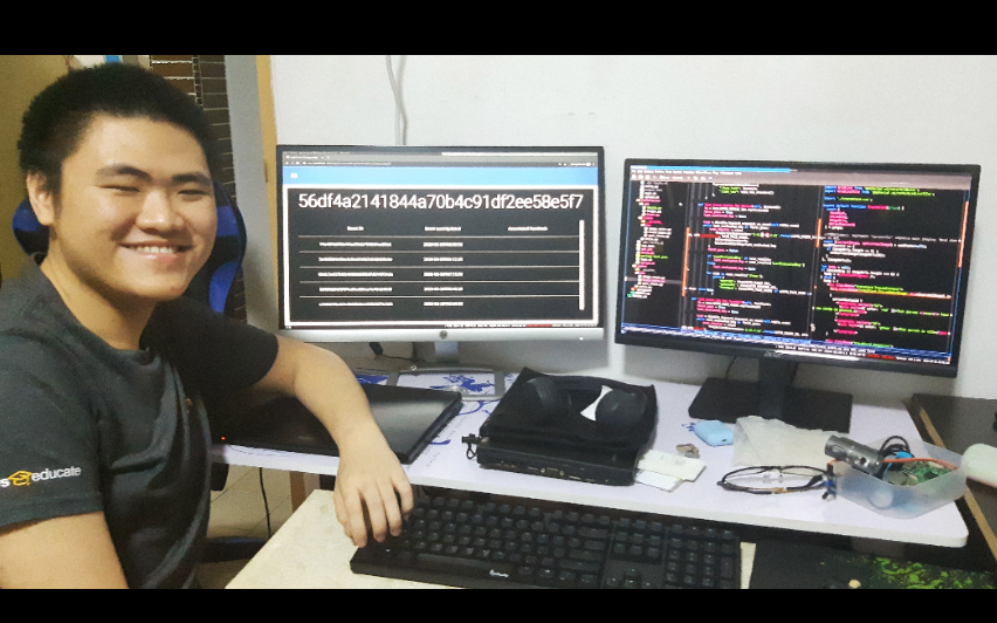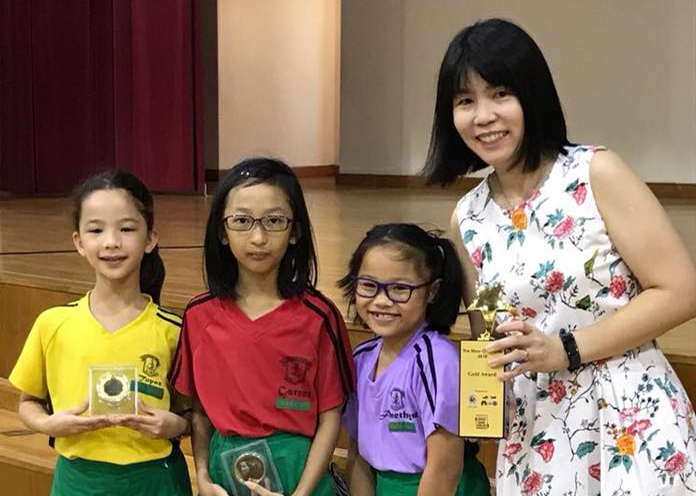It all started with a simple question.
“What happens if I click on this button?”
For James Lim En Hui, who just graduated from Singapore Polytechnic last month, this curiosity about computers and how they work began when he was seven years old.
“I was blown away when I realised that the games I enjoyed were just lines of letters and numbers in the background,” shared James.
Curiosity drives learning
It was this curiosity about what goes on behind the computer screen that got James to experiment and read up on programming on his own while he was in primary school. Well, that and a young boy’s desire to impress his friends.
“I remember I managed to change the text on a Facebook page as a prank,” James recalled. “My friends were amazed!”
His teacher was not too amused though and taught him that it was wrong to use his new-found skills to misinform others.
Chastised but undaunted, James continued learning by reading and watching videos about programming online. In the long break after his PSLE, he experimented with building his own websites. He soon picked up the basics of various programming languages including C#, Lua, Java and C++, and became proficient in them over the course of his secondary school years.
While his parents were worried about the amount of time he was spending on the computer and installed parental controls, James was able to bypass these.
But James also had a life outside of his computer and enjoyed the activities in his secondary school. In fact, he was the Unit Sergeant Major of his school’s National Cadet Corps (NCC) and – thanks to his primary school teacher perhaps – he was even a Cyberwellness Ambassador.
Securing a place in his dream course
Since Secondary 2, James knew he wanted a future in computing.
He did his research and found that Computer Engineering, which encompassed both the hardware and software elements in the computing field, best suited his interests.
Although he was pretty confident that he would be able to enter the Computer Engineering course with his O-level grades, James decided to apply for the Polytechnic Early Admissions Exercise (EAE).
He was attracted to EAE because it is an aptitude-based admission exercise that recognises talents and passions.
James explained, “I knew I could get in with my grades. But I wanted to go through the selection process. I wanted to show the interviewers what I could do and see if that was good enough. To me, that would be the best validation that I have made the right choice and I am indeed suitable for this course.”
In addition, James also wanted to experience going through an interview and use the opportunity to find out more about the campus environment and facilities.
Before the interview, James prepared his portfolio. Although he had no certificates related to computing, he had proof of his strong interest and talent in the form of the websites he had built and the codes he had written – all thirty pages of them.
Dr Tan Kwee Teck, one of the interviewers at James’ EAE selection, remembered being impressed by James’ confidence and calm way of answering questions.
He shared, “Even when we asked technical questions relating to his program, he was able to answer them well. We could see that James was very clear about what he wants, and he had the evidence to show his passion for the course he was applying to. That is what we are looking out for.”
Despite being offered a place in Singapore Polytechnic’s Computer Engineering course, James still put in his best effort in the O-level exams – and achieved a score that would have allowed him to enter most of the junior colleges in Singapore.
In fact, that was what many of his friends and relatives advised – why not go to a junior college instead?
However, James was not swayed.
“I have found my passion,” he shared. “I couldn’t wait to learn as much as I could about computing and I know the polytechnic route offers me that.”
New learning – life skills
In terms of learning new knowledge and skills about computing, Singapore Polytechnic’s Diploma in Computer Engineering course (DCPE) was all that James had hoped for. He could apply what he learnt, and challenge himself in new ways through the projects and activities designed by the lecturers.
Moreover, his lecturers also encouraged him to gain more experience by going for competitions and internships, which allowed him to understand the problems that real industries are facing.
Just last year, a lecturer encouraged him to try for an internship at Grab Singapore, even helping him rehearse for his interview. While at Grab, James also took part in the Build On Singapore Hackathon, organised jointly by Amazon Web Services, National University of Singapore, and the Government Technology Agency (Govtech).
James and his team won the polytechnic category with their prototype for an application that would help jobseekers complete tasks and showcase their capabilities to potential employers.
To him, the most important thing he learned from this experience was not the technical know-how though.
“During the internship, we were treated almost like full-time employees from the start, so we had to learn to do everything very quickly,” he explained.
“I learned to ask for help, but also find solutions on my own. I had to convince my supervisors that I should be given access to certain instructional materials, and once they saw that I really had the drive to learn, they did.”
Poly life – and beyond
Although life in polytechnic was busy, James enjoyed the nurturing environment and the collaboration with like-minded people in his course.
“[People at Poly] have their own passions. Once they find their purpose, they would go to great lengths to improve and hone their skills in that area. My fellow SP folk are the most hardworking and driven that I’ve met!”
James has just graduated as one of the top students in Singapore Polytechnic and is now looking at pursuing a computing-related degree in university. He hopes to bring the rich experience he has gained from the past three years to help him develop new technology that will change people’s lives.
To the students who are considering EAE or are facing a dilemma between going to a junior college or polytechnic, he has this advice to share:
“Remember that if there is no demand from industries, there will be no polytechnic course created. Make use of the Education and Career Guidance resources in your schools, go for open houses and find out more about the course you are interested in – then go for it!”






